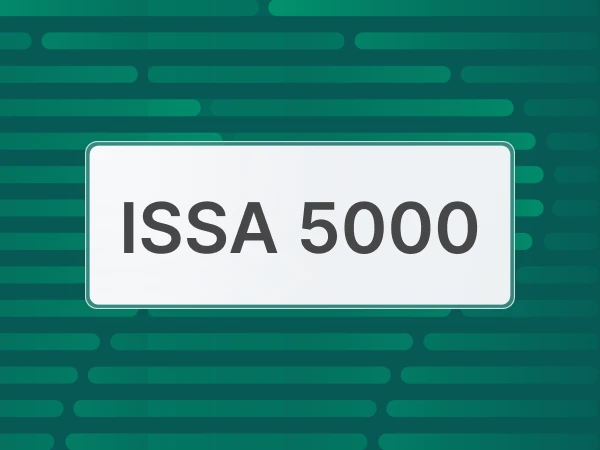What is the sustainability report: everything you need to know
The sustainability report (or sustainability report) is a reporting tool that allows you to communicate your business choices in the field of environmental, social and governance sustainability (ESG).
It represents, therefore, the formal commitment to achieving sustainability objectives, measure your effort, and improve your results year by year.
In Up2You we will help you to draft your sustainability report. With our technological platform Choral, we reduce the time for collecting and managing ESG data, and we simplify collaboration between project representatives. Get a sustainability report personalized with the identity of your company and aligned with the new European directives such as CSRD.
Simplify the preparation of report: discover the Up2You solution
Who is required to draw up the sustainability report?
From 1 January 2023, the directive came into force, which represented a small revolution in the European financial landscape: the CSRD (Corporate Sustainability Reporting Directive).
This is a directive on sustainability reporting of companies, which requires a greater number of companies to report their actions in the environmental and social fields. These requirements apply to companies of different sizes, and allow them a period to make this transition.
The application of these rules involves the 2024 all companies listed with more than 500 employees.
From 2025, on the other hand, will be subject to CSRD all listed companies and companies that have at least 2 of the following characteristics:
- a capital asset of more than 25 million euros;
- more than 250 employees;
- revenues exceeding 50 million euros.
From 2026, even small and medium-sized listed companies will be subject to reporting requirements, albeit simplified.
The listed SMEs will be able to choose whether to participate on an optional basis until 2028, year in which they too will have the obligation to report.

What are the differences between social report, sustainability report and financial statements
Before continuing, it is crucial to make a clear distinction between sustainability report, Social balance sheet and financial statements, since each of these responds to different logics and purposes, and even today companies are very confused between the different reporting tools.
- The sustainability report, as we have seen, focuses on communicating a company's commitment and performance with respect to environmental, social and governance objectives (ESG), offering a global vision of business impact.
- The Social balance sheet focuses on the social implications of business activity, such as the impact on staff well-being and working conditions.
- The financial statements represents a purely economic-financial instrument, which summarizes the company's financial, economic and financial position at the end of an accounting year. The latter is mandatory for all companies and aims to provide stakeholders with a clear picture of the company's financial health.
How to draw up a sustainability report: what are the reporting standards
In addition to establishing the requirements for which companies are required to report, the CSRD Establishes some unique reporting standards, aligned with other international initiatives such as the GRIS.
What are the GRI standards?
The Global Reporting Initiative (GRIS) represents the current point of reference for the drafting of sustainability reporting.
The GRI standards are a set of guidelines for the sustainability reporting: they consist of a modular and interdependent structure, so as to help organizations to better create reports in the economic, social and environmental fields.
How reporting standards change: from GRI to ESRS
The 31 July 2023 the European Commission has published the mandatory standards for sustainability reporting, which must be applied by companies subject to the reporting obligation: ESRS (European Sustainability Reporting Standards).
It is important, however, to underline the high degree of consistency between the principles of the two standards, which will make the transition easier for companies.
The European Sustainability Reporting Standards (ESRS) specify the information that companies are required to communicate and the structure for communicating that information.
They were developed by the European Advisory Group on Financial Reporting (EFRAG) and will be updated at least Every 3 years.
The ESRS requires companies to communicate information related to sustainability with the objective of:
- provide investors and stakeholders with access to the information necessary to assess investment risks related to climate change and other sustainability issues;
- ensure greater transparency about the impact of a company on people and the environment.
The ESRS provide 4 fields to be included in the report:
- governance;
- strategy;
- managing risks, opportunities and impacts;
- metrics and objectives.
Are you looking for an example of a budget aligned with the new directives? Download the Up2You financial statements, the first in Italy aligned with the CSRD directive and ESRS standards.
Download the Up2You balance sheet
The advantages of the sustainability report (even when it is not mandatory)
Since it was proposed the new European CSRD directive (Corporate Sustainability Reporting Directive), the sustainability report becomes obligatory for more companies and businesses every year, between now and the next 5 years.
If you have a small or medium-sized business, should you still draw up the sustainability report now? Yes, let's see why.
Let's take a few examples to understand the advantages you can derive by aligning your company with CSRD as soon as possible:
- You can attract investments and partners, who trust more those with transparent reporting;
- you can be chosen as a supplier by client companies interested in having a supply chain that performs from the point of view of sustainability;
- you can gather around you a staff of competent people prepared for the challenges of tomorrow, more encouraged to work with you if you demonstrate reliability;
- Can you meet the favor of conscious consumers, who rely more easily on those who share their values.
More than anything else, however, you can create one stock history undertaken by your company to respond to the needs of global warming.
This will be useful both for collaborating with large companies and multinationals, which are already looking for partners Active and sensitive in the field of sustainability, both for the moment when the obligation will also affect your sector.






























